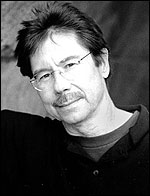| Sun | Mon | Tue | Wed | Thu | Fri | Sat |
|---|---|---|---|---|---|---|
| 1 | 2 | 3 | 4 | 5 | ||
| 6 | 7 | 8 | 9 | 10 | 11 | 12 |
| 13 | 14 | 15 | 16 | 17 | 18 | 19 |
| 20 | 21 | 22 | 23 | 24 | 25 | 26 |
| 27 | 28 | 29 | 30 | 31 |
CATEGORIES
RECENT ENTRIES
BLOG ROLL
How to pass the time
 Ever wonder why flashback, a staple of so many novels and short stories, can seem so artificial in movies? The action stops as the camera zooms in or the screen goes wobbly, and suddenly we reawaken in the distant past. “Flashback is one of the great gifts of fiction,” said poet and short-story writer Stuart Dybek, a device that allows writers to begin a story as close to the end as possible, “a fulcrum to escape the tyranny of cause and effect.” But “it’s the F-word in film.” The reason, Dybek said, has everything to do with “temporal mode”: fiction belongs to the narrative mode; film is captive to the dramatic.
Ever wonder why flashback, a staple of so many novels and short stories, can seem so artificial in movies? The action stops as the camera zooms in or the screen goes wobbly, and suddenly we reawaken in the distant past. “Flashback is one of the great gifts of fiction,” said poet and short-story writer Stuart Dybek, a device that allows writers to begin a story as close to the end as possible, “a fulcrum to escape the tyranny of cause and effect.” But “it’s the F-word in film.” The reason, Dybek said, has everything to do with “temporal mode”: fiction belongs to the narrative mode; film is captive to the dramatic.
In a talk last Wednesday in Classics 110, Dybek, the 2009 Kestnbaum writer-in-residence, explained to an audience of faculty and students that film and theater, however illusory, mimic the experience of real time in a way that fiction never does. To break that spell and travel back in time against the forward momentum of the action on screen or on stage takes a director as masterful as Federico Fellini or a playwright like Arthur Miller.
Meanwhile, “there is no real time in fiction,” Dybek said. “It’s impossible.” Even reading a story aloud does not create a sense of time passing. Nor does dialogue—though it comes closer. “In fact, what the hell time is in fiction is absolutely mysterious.”
And what about poetry? Some critics say Dybek’s own fiction often sounds more like verse than prose, and he told last week’s listeners that in the “lyrical mode”—where poetry operates—time may not exist at all. “You can fly, you can travel as you do in dreams,” he said. “In poetry we don’t follow the clock.”
Lydialyle Gibson
June 3, 2009
